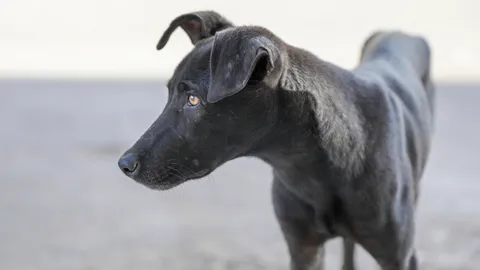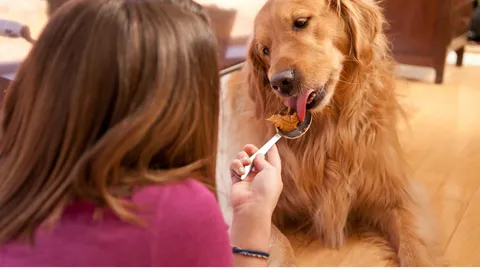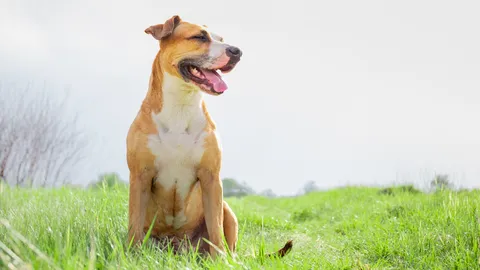Discovering that your beloved canine companion is looking a little thinner than usual can be a source of worry for any pet parent. While it’s natural to immediately seek solutions, the first and most crucial step is to schedule an appointment with your veterinarian. Unexplained weight loss in dogs can often be a symptom of underlying health issues. Once medical causes have been ruled out, or while working in conjunction with your vet, you can then explore effective Home Remedies To Get My Dog To Gain Weight safely and healthily.
Understanding Why Your Dog Might Be Underweight
Before diving into dietary adjustments, it’s essential to understand the potential reasons behind your dog’s weight loss or inability to gain weight. Identifying the root cause is key to implementing the right strategy.
When to See Your Vet: Underlying Health Conditions
A sudden or gradual decline in weight without changes to diet or exercise often points to a medical condition. If your dog exhibits symptoms like diarrhea, loss of appetite, vomiting, or unusual lethargy, these are immediate red flags requiring veterinary attention. Common health issues that can lead to significant weight loss include:
- Cancer: Various forms of cancer can cause a dog to lose weight rapidly.
- Dental problems: Painful teeth or gums can make eating difficult and decrease food intake.
- Diabetes mellitus: This metabolic disorder affects how the body uses sugar for energy.
- Food allergies: Chronic digestive upset from allergies can hinder nutrient absorption.
- Gastrointestinal disorders: Conditions like inflammatory bowel disease (IBD) impact digestion.
- Kidney or Liver disease: These organ dysfunctions can lead to poor appetite and metabolic issues.
- Megaesophagus: A condition where the esophagus loses tone, making it difficult for food to reach the stomach.
- Parasites: Internal parasites, such as worms, can steal nutrients, leading to weight loss despite adequate food intake. If you suspect parasites, discussing effective treatments like an all in one flea and wormer for dogs or a dog wormer and flea treatment in one tablet with your vet is crucial.
Pregnancy and nursing can also temporarily cause weight loss in female dogs due to increased energy demands. Similarly, some older dogs may naturally lose muscle mass. However, if weight loss persists to the point where ribs are easily visible, a vet visit is imperative.
Beyond Medical Issues: Stress and Food Dynamics
Even a healthy dog can struggle to gain weight. Environmental or behavioral factors might be at play:
- Stress: Changes in routine, a new home, or the introduction of a new pet can cause stress, leading to decreased appetite and weight loss. Just like humans, dogs can be sensitive to their environment, affecting their eating habits.
- Food Competition: In multi-dog households, a shy or submissive dog might not get enough food if more assertive companions push them away during meal times. Observing your dogs during feeding can reveal such dynamics.
How to Assess Your Dog’s Weight Loss at Home
Before your vet appointment, or to better understand the situation, here’s how you can monitor your dog:
- Observe eating habits: Pay close attention to how much your dog eats and their enthusiasm for food. Also, note their bathroom habits.
- Check overall health: Look for any other behavioral changes or physical symptoms.
- Review feeding guidelines: Compare your dog’s current intake with the recommended portions on their food packaging. You might find you’re underfeeding slightly.
- Consider their diet: Is their current food high-calorie and nutrient-rich? Sometimes a simple switch to a different formulation can make a difference.
 A thin, black dog looking off into the distance
A thin, black dog looking off into the distance
Effective Home Remedies to Help Your Dog Gain Weight Safely
Once your veterinarian has confirmed your dog is healthy, you can start implementing practical home remedies to get my dog to gain weight. These methods focus on enhancing calorie and nutrient intake through safe, readily available options and optimizing feeding routines.
Dietary Adjustments: Boosting Calories and Nutrients
The foundation of healthy weight gain for dogs is a high-quality, balanced diet. Here are some home-based dietary remedies:
- High-Calorie, Nutrient-Dense Dog Food: While not strictly a “home remedy” in the sense of human food, choosing a dog food specifically formulated for active dogs, puppies, or weight gain can be very effective. Look for brands with higher protein and fat content.
- Increased Meal Frequency: Instead of two large meals, offer three or four smaller meals throughout the day. This can be easier on their digestive system and ensure a more consistent caloric intake.
- Add Cooked Grains and Starches: Cooked sweet potatoes and pumpkin are excellent additions. They are palatable, easy to digest, and provide healthy carbohydrates and fiber. Pureed pumpkin is especially good for sensitive stomachs.
- Healthy Fats and Proteins:
- Peanut Butter: A dollop of plain, unsweetened peanut butter (xylitol-free) can be a delicious, calorie-dense addition to their meal or as a treat.
- Cooked Chicken Liver: In moderation, cooked chicken liver is highly palatable and packed with protein and vitamins.
- Cottage Cheese or Plain Yogurt: Full-fat cottage cheese or plain, unsweetened yogurt can provide protein, calcium, and probiotics to support digestive health.
- Fish Oil: A small amount of fish oil (like salmon oil) can add healthy omega-3 fatty acids and calories. Always ensure it’s specifically formulated for pets or consult your vet on dosage.
- Boiled Chicken or Tuna: Shredded boiled chicken (skinless, boneless) or canned tuna in water (drained) can entice picky eaters and add lean protein.
- Cheese: Small amounts of cheese can be a high-fat, high-protein treat that many dogs adore. However, introduce slowly to avoid stomach upset.
- High-Fat Treats: Offer high-fat treats, especially before bedtime. Look for treats with protein as the first ingredient, such as dried chicken, salmon, beef, or lamb. These can be a significant caloric boost between meals.
- Raw Meats (with caution): While some owners advocate for raw feeding, it comes with risks. If you consider adding raw meats, discuss it with your vet to ensure safety and proper nutritional balance.
 A Golden Retriever eating peanut butter from a woman in an attempt to help the dog fatten up a bit
A Golden Retriever eating peanut butter from a woman in an attempt to help the dog fatten up a bit
Optimizing Feeding Habits for Weight Gain
Sometimes, it’s not just what you feed, but how you feed that matters.
- Calm Feeding Environment: Ensure your dog has a quiet, stress-free space to eat, especially if there are other pets in the household. Feeding them separately can prevent anxiety and food competition.
- Consistent Schedule: Dogs thrive on routine. A consistent feeding schedule can help regulate their appetite and digestive system.
The Role of Exercise in Healthy Weight Gain
You might think reducing exercise would help your dog gain weight, but the opposite is often true for healthy weight gain.
- Maintain Regular Exercise: Regular physical activity helps stimulate appetite, build healthy muscle mass, and keeps their metabolism working efficiently. It also ensures the weight gained is muscle, not just fat.
- Build Muscle Mass: If your dog is underweight due to lack of muscle, incorporating exercises that build muscle (like short walks, gentle fetching, or swimming) alongside a diet rich in amino acids, protein, and healthy fats is crucial. Remember to provide plenty of water and rest, especially in warm weather. For dogs with joint pain, consider supplements that aid joint health. You can learn more about managing joint issues, such as can a torn acl in a dog heal itself, to keep them comfortable during activity.
Safe Human Foods to Supplement Your Dog’s Diet
While your dog’s primary diet should always be a high-quality, AAFCO-compliant dog food, certain human foods can be excellent supplements for weight gain. These should be introduced gradually and in moderation to avoid digestive upset. Always ensure they are plain, unseasoned, and free from any toxic ingredients (like onions, garlic, or xylitol).
- Cheese: Small cubes or shreds of cheese (cheddar, mozzarella) offer calories and protein.
- Chicken Liver: Cooked and finely chopped.
- Cottage Cheese: Full-fat versions are best for adding calories.
- Fish Oil: A few drops mixed into their food (vet-approved dosage).
- Peanut Butter: Xylitol-free and unsalted.
- Pumpkin: Canned pure pumpkin (not pie filling) is excellent for digestion and adds calories.
- Sweet Potato: Cooked and mashed.
- Tuna: Canned in water, drained, and in moderation due to mercury content.
These appealing additions can make meals more enticing, even for the fussiest eaters, and provide a caloric boost.
When Home Remedies Aren’t Enough: Professional Guidance
While home remedies can be incredibly helpful, remember they are most effective when used in conjunction with veterinary advice. If your dog isn’t responding to dietary changes or home-based strategies, your vet can offer specialized guidance.
Your veterinarian can recommend specific therapeutic diets designed for weight gain, which are often highly palatable, easily digestible, and calorie-dense. They can also help you understand how to read dog food labels to ensure you’re choosing options rich in protein and healthy fats, which are vital for building muscle and providing sustained energy.
 A white and tan dog enjoying nature with a big smile on his face
A white and tan dog enjoying nature with a big smile on his face
Your furry friend is a cherished member of your family, and their health and well-being are paramount. Seeing your dog lose weight can be distressing, but with a systematic approach, you can help them regain their healthy physique. Always start with a veterinary check-up to rule out any underlying health conditions. Once cleared, a combination of thoughtful dietary adjustments, a calm eating environment, consistent routines, and appropriate exercise can make a significant difference.
By focusing on these effective home remedies to get my dog to gain weight, you can ensure your dog enjoys a long, healthy, and happy life by your side. For more insights into canine health and well-being, explore other articles on Dog Care Story, such as how to address issues like how to heal a dog’s dry nose or how to heal a ripped paw pad.
References:
- 4 Ways to Fatten Up a Dog. WikiHow.
- How To Build Muscle On A Dog With Food. BarkVA.org.
- Tips for Choosing a Food for Dog Weight Gain. PetMD.
